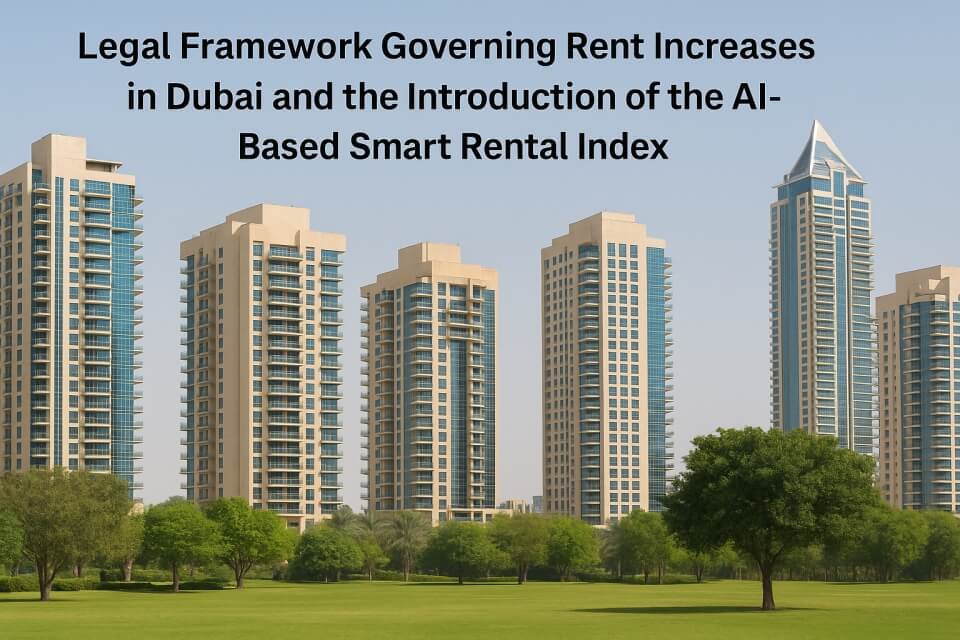Legal blog
Dubai Rent Increase Rules and the New AI-Powered Smart Rental Index

Legal Framework Governing Rent Increases in Dubai and the Introduction of the AI-Based Smart Rental Index
The regulation of rent increases in the Emirate of Dubai has undergone significant development with the recent announcement by the Dubai Land Department regarding the introduction of an Artificial Intelligence-powered Smart Rental Index.
This development aims to enhance transparency, fairness, and market alignment in the relationship between landlords and tenants. This article provides a legal overview of the current framework regulating rent increases, the statutory requirements for implementing such increases, and the anticipated legal implications of the new Smart Index.
1. Legal Basis for Rent Regulation in Dubai
The primary legislation governing the relationship between landlords and tenants in Dubai is Law No. (26) of 2007, as amended by Law No. (33) of 2008 (hereinafter referred to as the "Dubai Tenancy Law"). Pursuant to Article (9) of the amended law, the rent amount may not be in-creased unless both parties agree or unless such increase is justified under the provisions of the law and in accordance with the applicable rental indices.
In accordance with Article (14) of the Dubai Tenancy Law:
"If either party to the tenancy contract wishes to amend any of its terms, whether relating to the rent value or otherwise, such party must notify the other party of the same no less than ninety (90) days prior to the expiry date of the tenancy contract, unless otherwise agreed by both par-ties."
This legal provision establishes the 90-day statutory notice requirement for any proposed rent increase. Failure to observe this notice period renders the proposed amendment legally ineffective.
2. Rent Increases and the RERA Index System
Historically, the Real Estate Regulatory Agency (RERA), a division of the Dubai Land Department, has published a rental index to determine the permissible percentage of rent increases upon renewal. The permitted increase is subject to a scale defined by Decree No. (43) of 2013, which links the maximum allowable increase to the difference between the current rent and the average market rent for similar properties in the same area.
In summary:
- If the current rent is within 10% of the average market rent: no increase is allowed.
- If the rent is 11–20% below: the maximum increase is 5%.
- If 21–30% below: up to 10%.
- If 31–40% below: up to 15%.
- If more than 40% below: up to 20%.
These limits continue to be legally binding and are applied upon satisfaction of the 90-day notice requirement.
3. Introduction of the Smart Rental Index
In January 2025, the Dubai Land Department launched a new AI-based Smart Rental Index, which is designed to replace the former RERA index system. Unlike the previous model, which was updated periodically, the new Smart Index is updated in real time and utilises artificial intelligence to assess market rental values based on recent transactions, building classification, and quality.
A significant legal implication of this transition is that the rental value is now determined based not only on area averages but also on the specific condition and star rating of the building in question. This refined approach ensures that rent increases reflect the true market value and quality of the leased premises, thereby preventing arbitrary or unjustified increases.
While the Smart Index introduces enhanced precision, it does not supersede the statutory caps established under Decree No. (43) of 2013. Therefore, any increase remains subject to the percentage thresholds defined therein, and compliance with the 90-day notice rule remains mandatory.
4. Legal Implications for Tenants and Landlords
For landlords, the Smart Index provides a data-backed basis for justifying rent increases, especially in cases where the current rent falls significantly below market value. However, landlords remain legally prohibited from implementing such increases without adherence to the required notice period and index guidelines.
For tenants, the new system enhances legal protection by ensuring that any proposed rent increase must be substantiated by objective criteria tied to the specific building’s classification and prevailing market conditions. Tenants may contest unlawful increases by filing a complaint before the Dubai Rental Disputes Centre, which remains the competent authority for adjudicating such matters.
Conclusion
The introduction of the Smart Rental Index represents a significant evolution in the regulation of rental values in Dubai. While the legal principles governing rent increases—namely, the percentage limits and the 90-day notice requirement—remain unchanged, the mechanism for determining market value has shifted toward greater accuracy and fairness. Both landlords and tenants must remain vigilant in ensuring compliance with the updated regulatory framework and are advised to consult the Smart Index prior to proposing or accepting any change in rent.
Written by:
Mahmoud Khashaba | Alhajeya Alnoobi Advocates & Legal Consultants

This publication is for general information purposes only. It does not purport to provide comprehensive full legal or other advice.
Legal Advice Middle East and the contributors accept no responsibility for losses that may arise from reliance upon information contained in this publication. This publication is intended to give an indication of legal issues upon which you may need advice.
Full legal advice should be taken in due course from a qualified professional when dealing with specific situations.





